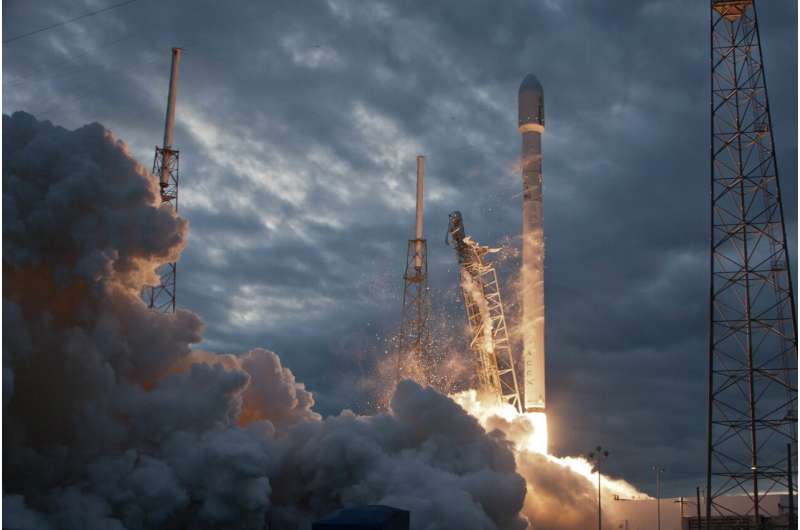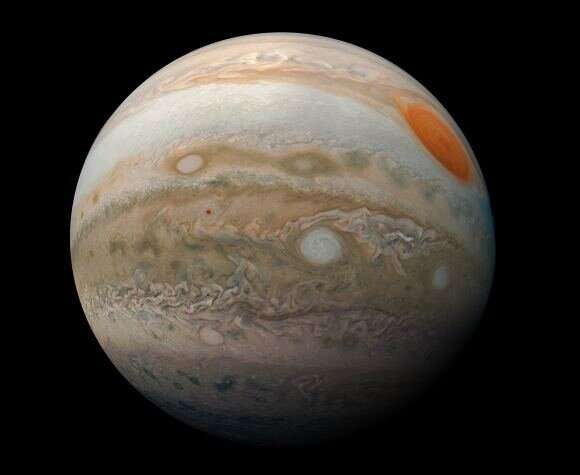
Copernical Team
Stars determine their own masses
 Last year, a team of astrophysicists including key members from Northwestern University launched STARFORGE, a project that produces the most realistic, highest-resolution 3D simulations of star formation to date. Now, the scientists have used the highly detailed simulations to uncover what determines the masses of stars, a mystery that has captivated astrophysicists for decades.
In a new s
Last year, a team of astrophysicists including key members from Northwestern University launched STARFORGE, a project that produces the most realistic, highest-resolution 3D simulations of star formation to date. Now, the scientists have used the highly detailed simulations to uncover what determines the masses of stars, a mystery that has captivated astrophysicists for decades.
In a new s Stars shed light on why stellar populations are so similar in Milky Way
 Scientists have uncovered what sets the masses of stars, a mystery that has captivated astrophysicists for decades. Their answer? Stars, themselves.
Using highly detailed simulations, a collaborative team led by researchers from the University of Texas at Austin has made a breakthrough discovery that star formation is a self-regulatory process, knowledge that may allow researchers to under
Scientists have uncovered what sets the masses of stars, a mystery that has captivated astrophysicists for decades. Their answer? Stars, themselves.
Using highly detailed simulations, a collaborative team led by researchers from the University of Texas at Austin has made a breakthrough discovery that star formation is a self-regulatory process, knowledge that may allow researchers to under Lowell Observatory points telescopes at Saturn during closest annual approach
 Saturn will soon be at its biggest and brightest of the year, and Lowell Observatory is celebrating with nightly public telescope viewing. For the next several weeks, visitors will be able to gaze at this gas giant and see its dazzling system of rings, as well as some of its larger moons.
This Saturn viewing season centers around the planet's August 14 opposition. The term opposition indic
Saturn will soon be at its biggest and brightest of the year, and Lowell Observatory is celebrating with nightly public telescope viewing. For the next several weeks, visitors will be able to gaze at this gas giant and see its dazzling system of rings, as well as some of its larger moons.
This Saturn viewing season centers around the planet's August 14 opposition. The term opposition indic Ten Earth years later and Curiosity is still exploring Mars
 "We've got thumbnails!!" shouted, emotionally, over excited celebrations, is my most intense memory from 10 years ago. I had sat, with a lot of colleagues from my home university, The Open University here in the UK, in a seminar room, NASA TV on the big screen, anxiously watching the proceedings since 6.30 am on the 6th of August. The UK is 8 time zones ahead of Pasadena in California, where it
"We've got thumbnails!!" shouted, emotionally, over excited celebrations, is my most intense memory from 10 years ago. I had sat, with a lot of colleagues from my home university, The Open University here in the UK, in a seminar room, NASA TV on the big screen, anxiously watching the proceedings since 6.30 am on the 6th of August. The UK is 8 time zones ahead of Pasadena in California, where it The space economy gets major tech advancement with hybrid mobility packages
 With hybrid vehicle sales at an all-time high on Earth, Benchmark Space Systems has announced a definitive agreement to acquire Alameda Applied Sciences Corporation (AASC)'s electric propulsion technologies to help power hybrid spacecraft designed to ultimately run on in-space resources and repurposed space debris.
Benchmark's turn-key hybrid chemical + electric propulsion systems will lev
With hybrid vehicle sales at an all-time high on Earth, Benchmark Space Systems has announced a definitive agreement to acquire Alameda Applied Sciences Corporation (AASC)'s electric propulsion technologies to help power hybrid spacecraft designed to ultimately run on in-space resources and repurposed space debris.
Benchmark's turn-key hybrid chemical + electric propulsion systems will lev Northrop Grumman teams with Firefly to further develop Antares launcher
 Northrop Grumman Corporation (NYSE: NOC) and Firefly Aerospace have joined forces to provide an American-built first-stage upgrade for the Antares rocket and a new medium launch vehicle to serve commercial, civil and national security space launch markets.
"Through our collaboration, we will first develop a fully domestic version of our Antares rocket, the Antares 330, for Cygnus space sta
Northrop Grumman Corporation (NYSE: NOC) and Firefly Aerospace have joined forces to provide an American-built first-stage upgrade for the Antares rocket and a new medium launch vehicle to serve commercial, civil and national security space launch markets.
"Through our collaboration, we will first develop a fully domestic version of our Antares rocket, the Antares 330, for Cygnus space sta What part of a space rock survives to the ground?
 When a small asteroid enters Earth's atmosphere from space, its surface is brutally heated, causing melting and fragmenting. Therefore, it was somewhat of a mystery why the rocks near the surface survive to the ground as meteorites. That mystery is solved in a new study of the fiery entry of asteroid 2008 TC3, published online in Meteoritics and Planetary Science.
"Most of our meteorites
When a small asteroid enters Earth's atmosphere from space, its surface is brutally heated, causing melting and fragmenting. Therefore, it was somewhat of a mystery why the rocks near the surface survive to the ground as meteorites. That mystery is solved in a new study of the fiery entry of asteroid 2008 TC3, published online in Meteoritics and Planetary Science.
"Most of our meteorites US should end ISS collaboration with Russia
 In the same week that Russians circulated a horrific video of a Ukrainian soldier being castrated before his murder by Putin's invading troops, and dozens of Ukrainians POWs were slaughtered while in Russian captivity, the Russian space agency Roscosmos declared that Russia would depart the International Space Station program "after 2024", while the US Congress authorized NASA to extend the prog
In the same week that Russians circulated a horrific video of a Ukrainian soldier being castrated before his murder by Putin's invading troops, and dozens of Ukrainians POWs were slaughtered while in Russian captivity, the Russian space agency Roscosmos declared that Russia would depart the International Space Station program "after 2024", while the US Congress authorized NASA to extend the prog Commercial satellite race raises calls for more regulations

Rapidly evolving technology and space debris reported in several places around the world—including pieces of a Chinese Long March 5B Rocket in the Indian Ocean—signal the need for a new era for regulation of space, Flinders University experts say.
Their timely new report is calling on governments to pay more attention to the use of low-Earth orbit as space laws and technologies race ahead at high speed.
Ahead of a meeting of intergovernmental experts at next year's World Radio Conference, the space experts from the Flinders University's Jeff Bleich Centre are raising concerns on several fronts, commencing with the takeoff of commercial interest in satellite "mega-constellations" in Low-Earth Orbit (LEO).
"While there are laws that cover space activities, they are already under stress because of the speed at which the commercial space industry is evolving," says research associate in space law Joel Lisk, from the Jeff Bleich Centre at Flinders University's College of Business, Government and Law.
"There is a need to work towards ensuring that we have broad and flexible regulatory settings that are geared to rapid change and future developments.
Jupiter missions could also help search for dark matter

In a recent study published in the Journal of High Energy Physics, two researchers from Brown University demonstrated how data from past missions to Jupiter can help scientists examine dark matter, one of the most mysterious phenomena in the universe. The reason past Jupiter missions were chosen is due to the extensive amount of data gathered about the largest planet in the solar system, most notably from the Galileo and Juno orbiters. The elusive nature and composition of dark matter continues to elude scientists, both figuratively and literally, because it does not emit any light.

